

Stress and anxiety aren't always bad: People generally think of stress and anxiety as negative concepts, but while both stress and anxiety can reach unhealthy levels, psychologists have long known that both are unavoidable -- and that they often play a helpful, not harmful, role in our daily lives, according to a presentation at the annual convention of the American Psychological Association.
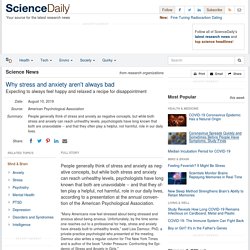
"Many Americans now feel stressed about being stressed and anxious about being anxious. Unfortunately, by the time someone reaches out to a professional for help, stress and anxiety have already built to unhealthy levels," said Lisa Damour, PhD, a private-practice psychologist who presented at the meeting. Damour also writes a regular column for The New York Times and is author of the book "Under Pressure: Confronting the Epidemic of Stress and Anxiety in Girls.
" Anxiety, too, gets an unnecessarily bad rap, according to Damour. Causes of stress: The phone is ringing off the hook.
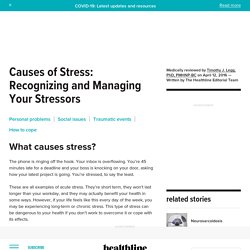
Your inbox is overflowing. You’re 45 minutes late for a deadline and your boss is knocking on your door, asking how your latest project is going. You’re stressed, to say the least. Causes of stress in university students: We all know how stressful university life can be.
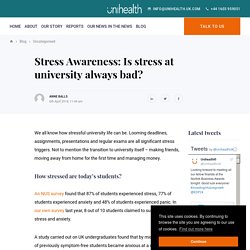
Looming deadlines, assignments, presentations and regular exams are all significant stress triggers. Not to mention the transition to university itself – making friends, moving away from home for the first time and managing money. How stressed are today’s students? Why are students at university so stressed? Mounting social and academic pressures mean that higher education can be a challenge for any student.
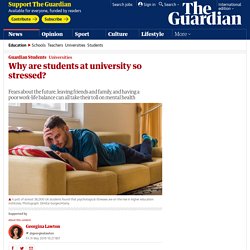
A Uni Health study found that 80% of those studying in higher education reported symptoms of stress or anxiety, while one NUS survey found that nine in 10 students experienced stress. Uncertainty around Brexit and rising living costs mean that many students don’t feel confident about finding a job. Alex, an international relations and politics student at the University of Leicester, says he’s constantly worried about graduate life. “There’s that fear of having to adjust back to life back home.
I always think, what sector do I want to work in? Hannah Morrish, a psychotherapist and the higher education lead at The Student Room, says students are increasingly questioning whether university is worth the cost. Leaving the structures of home and family for the first time can often exacerbate mental health problems. Cognitive Appraisal of Dissertation Stress Among Undergraduate Students. Symptoms of stress: Lesser-known signs indicating that you are stressed out: Escaping stress is almost impossible in today’s fast-paced world, but there are many ways to reduce or relieve it: practicing mindfulness and positive self-talk, exercising regularly, as well as maintaining a healthy diet and healthy relationships.

If you're not sure how to control the triggers, consider seeing a professional counselor or therapist. They can help you develop cognitive-behavioral coping skills. Otherwise, ignoring high levels of anxiety can increase the risk of high blood pressure, a heart attack, or even stroke. "It’s always important to find different ways of decreasing your stress," says Dr. Aivaz. "If you’re feeling a little tense from an upsetting situation, try decompressing with a quick massage or taking a yoga class—it might just do the trick.
" Cognitive Distortions and Stress. When you think about your life, it is quite possible that your mind is playing tricks on you that can distort your view.
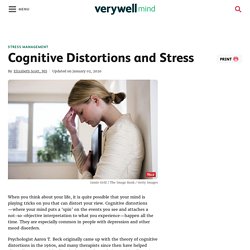
Cognitive distortions—where your mind puts a ‘spin’ on the events you see and attaches a not-so-objective interpretation to what you experience—happen all the time. They are especially common in people with depression and other mood disorders. Psychologist Aaron T. Beck originally came up with the theory of cognitive distortions in the 1960s, and many therapists since then have helped clients live more positive lives by hunting down their cognitive distortions and correcting them. (It’s one of the tenets of a very successful and fast-working mode of therapy called cognitive therapy.) When you know what to be on the lookout for, it becomes rather easy to spot the cognitive distortions in others. Burnout: Becoming aware of stress: People do not need to study the biology of stress to gain a practical understanding of how it affects them.
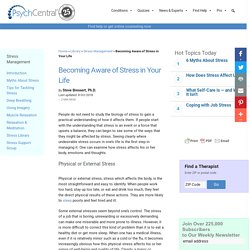
If people start with the understanding that stress is an event or a force that upsets a balance, they can begin to see some of the ways that they might be affected by stress. Seeing clearly where undesirable stress occurs in one’s life is the first step in managing it. Student stress: self-help tips. Starting university can be a stressful experience, as well as being fun and exciting.
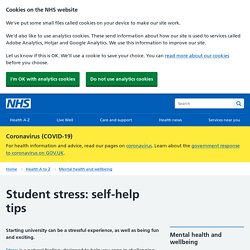
Stress is a natural feeling, designed to help you cope in challenging situations. In small amounts it can be good, because it pushes you to work hard and do your best, such as during exams. But if you are feeling very stressed or feel you cannot manage stress, it can lead to mental health problems such as depression and anxiety. It can also affect your academic performance. Leaving home to start your studies can involve some stressful changes. Tips on surviving exams. Being well prepared for your exams is the best way to overcome stress and anxiety, and gives you the best chance of getting good grades.
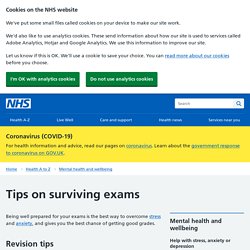
Revision tips Make a realistic revision schedule. How to Get Stress Relief With Cognitive Therapy. Negative thoughts can create more stress in our lives.
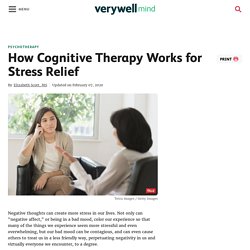
Not only can "negative affect," or being in a bad mood, color our experience so that many of the things we experience seem more stressful and even overwhelming, but our bad mood can be contagious, and can even cause others to treat us in a less friendly way, perpetuating negativity in us and virtually everyone we encounter, to a degree. Video: Body Scan Meditation.